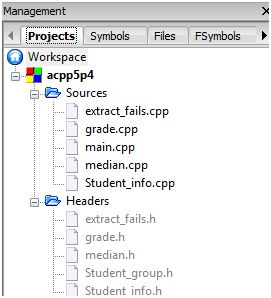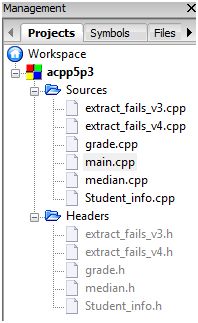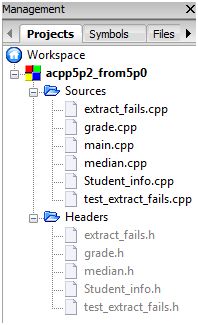Exercise 5-4
Look again at the driver functions you wrote in the previous exercise. Note that it is possible to write a driver that differs only in the declaration of the type for the data structure that holds the input file. If your vector and list test drivers differ in any other way, rewrite them so that they differ only in this declaration.
Solution
The objective is to further streamline the program, so that the only change required for switching between running a vector-based and list-based workstream is a one-liner change at the declaration level.
My Solution to Exercise 5-3 require 2-line change (rather than just 1-line), so obviously there are opportunities to improve. I also see that the program contains two near identical set of source and header files (i.e. extract_fails_v3.cpp/.h, extract_fails_v4.cpp/.h) – it is very likely that we can consolidate into just one set (i.e. extract_fails.cpp/.h) – as the only difference resides on the fact that one uses vector and the other uses list – other than that, the codes are effectively the same.
So here is a rather neat way to achieve our objective (and it works!)
- Create a new Student_info.h to store the a new type Student_group (defined by typedef) – which may be either vector or list based. To switch between using vector-based Student_group or list-based Student_group, we just need to do a one-liner change in this file. All other files are intact.
- Consolidate extract_fails_v3.cpp/.h (vector based) and extract_fails_v4.cpp/.h (list based) into one extract_fails.cpp/.h. (generic Student_group based)
- Refresh the #include directives within the codes as required.
The Project
For completeness I shall include all the files here.

- main.cpp
- extract_fails.h
- extract_fails.cpp
- grade.h
- grade.cpp
- median.h
- median.cpp
- Student_info.h
- Student_info.cpp
- Student_group.h
main.cpp
#include <iostream>
#include "Student_info.h"
#include "Student_group.h" // switch between vector and list based Student_group here
#include "grade.h"
#include "extract_fails.h"
using std::cin;
using std::cout;
using std::endl;
int main()
{
Student_group students;
Student_info record;
// read and store all the student's data.
while (read(cin, record))
students.push_back(record);
// Extract the failed students
Student_group students_failed = extract_fails(students);
// sort vector and sort list are different
// so we remove from here for now.
cout << endl;
// Report passing students
cout << "These students have passed." << endl;
for (Student_group::const_iterator iter = students.begin();
iter != students.end(); ++iter)
cout << iter->name << " (" << grade(*iter) << ")" << endl;
cout << endl;
// Report failing students
cout << "These students have failed." << endl;
for (Student_group::const_iterator iter = students_failed.begin();
iter != students_failed.end(); ++iter)
cout << iter->name << " (" << grade(*iter) << ")" << endl;
return 0;
}
extract_fails.h
#ifndef GUARD_EXTRACT_FAILS_H #define GUARD_EXTRACT_FAILS_H // extract_fails.h #include "Student_group.h" Student_group extract_fails(Student_group&); #endif // GUARD_EXTRACT_FAILS_H
extract_fails.cpp
#include "Student_info.h"
#include "Student_group.h"
#include "grade.h"
// separate passing and failing student records
// derived from S5.5/85
Student_group extract_fails(Student_group& students)
{
Student_group fail;
Student_group::iterator iter = students.begin();
while (iter != students.end())
{
if (fgrade(*iter))
{
fail.push_back(*iter);
iter = students.erase(iter);
}
else
++iter;
}
return fail;
}
grade.h
#ifndef GUARD_GRADE_H #define GUARD_GRADE_H // grade.h #include <vector> #include "Student_info.h" double grade(double, double, double); double grade(double, double, const std::vector<double>&); double grade(const Student_info&); bool fgrade(const Student_info&); #endif // GUARD_GRADE_H
grade.cpp
#include <stdexcept>
#include <vector>
#include "grade.h"
#include "median.h"
#include "Student_info.h"
using std::domain_error;
using std::vector;
// definitions for the grade functions from S4.1/52, S4.1.2/54, S4.2.2/63
// compute a student's overall grade from midterm and final exam
// grades and homework grade (S4.1/52)
double grade(double midterm, double final, double homework)
{
return 0.2 * midterm + 0.4 * final + 0.4 * homework;
}
// compute a student's overall grade from midterm and final exam grades
// and vector of homework grades.
// this function does not copy its argument, because median (function) does it for us.
// (S4.1.2/54)
double grade(double midterm, double final, const vector<double>& hw)
{
if (hw.size() == 0)
throw domain_error("student has done no homework");
return grade(midterm, final, median(hw));
}
// this function computes the final grade for a Student_info object
// (S4.2.2/63)
double grade(const Student_info& s)
{
return grade(s.midterm, s.final, s.homework);
}
// predicate to determine whether a student failed
// (S5.1/75)
bool fgrade(const Student_info& s)
{
return grade(s) < 60;
}
median.h
#ifndef GUARD_MEDIAN_H #define GUARD_MEDIAN_H // median.h #include <vector> double median(std::vector<double>); #endif // GUARD_MEDIAN_H
median.cpp
// source file for the median function
#include <algorithm>
#include <stdexcept>
#include <vector>
using std::domain_error;
using std::sort;
using std::vector;
// compute the median of a vector<double>
double median(vector<double> vec)
{
typedef vector<double>::size_type vec_sz;
vec_sz size = vec.size();
if (size == 0)
throw domain_error("median of an empty vector");
sort(vec.begin(),vec.end());
vec_sz mid = size/2;
return size % 2 == 0 ? (vec[mid] + vec[mid-1]) / 2 : vec[mid];
}
Student_info.h
#ifndef GUARD_STUDENT_INFO_H
#define GUARD_STUDENT_INFO_H
// Student_info.h
#include <iostream>
#include <string>
#include <vector>
struct Student_info
{
std::string name;
double midterm, final;
std::vector<double> homework;
};
bool compare(const Student_info&, const Student_info&);
std::istream& read(std::istream&, Student_info&);
std::istream& read_hw(std::istream&, std::vector<double>&);
#endif // GUARD_STUDENT_INFO_H
Student_info.cpp
#include "Student_info.h"
using std::istream;
using std::vector;
// we are interested in sorting the Student_info object by the student's name
bool compare(const Student_info& x, const Student_info& y)
{
return x.name < y.name;
}
// read student's name, midterm exam grade, final exam grade, and homework grades
// and store into the Student_info object
// (as defined in S4.2.2/62)
istream& read(istream& is, Student_info& s)
{
// read and store the student's name and midterm and final exam grades
is >> s.name >> s.midterm >> s.final;
// read and store all the student's homework grades
read_hw(is, s.homework);
return is;
}
// read homework grades from an input stream into a vector<double>
// (as defined in S4.1.3/57)
istream& read_hw(istream& in, vector<double>& hw)
{
if (in)
{
// get rid of previous contents
hw.clear();
// read homework grades
double x;
while (in >> x)
hw.push_back(x);
// clear the stream so that input will work for the next student
in.clear();
}
return in;
}
Student_group.h
#ifndef GUARD_STUDENT_GROUP_H #define GUARD_STUDENT_GROUP_H // Student_group.h #include <list> #include <vector> #include "Student_info.h" // ********************* AMEND THIS *************************** // Solution to Exercise 5-4: Pick one of the followings //typedef std::vector<Student_info> Student_group; typedef std::list<Student_info> Student_group; // ************************************************************ #endif // GUARD_STUDENT_GROUP_H
Test Program and Results
For all tests below (vector based and list based) I shall supply this set of 10 lines student’s info as the input.
Kate 88.88 88.88 88.88 88.88 88.88 John 55.55 55.55 55.55 55.55 55.55 Pat 66.66 66.66 66.66 66.66 66.66 Joe 100.00 100.00 100.00 100.00 100.00 Mary 11.11 11.11 11.11 11.11 11.11 Bill 33.33 33.33 33.33 33.33 33.33 Jay 22.22 22.22 22.22 22.22 22.22 Bob 4.00 4.00 4.00 4.00 4.00 Fred 77.77 77.77 77.77 77.77 77.77 Louis 44.44 44.44 44.44 44.44 44.44
We shall see that both tests yield the same result.
Test 1 – vector based version
Amend the Student_group.h accordingly (one-liner change).
// ********************* AMEND THIS *************************** // Solution to Exercise 5-4: Pick one of the followings typedef std::vector<Student_info> Student_group; // typedef std::list<Student_info> Student_group; // ************************************************************
Test 1 Result
These students have passed. Kate (88.88) Pat (66.66) Joe (100) Fred (77.77) These students have failed. John (55.55) Mary (11.11) Bill (33.33) Jay (22.22) Bob (4) Louis (44.44)
Test 2 – list based version
Amend the Student_group.h accordingly (one-liner change).
// ********************* AMEND THIS *************************** // Solution to Exercise 5-4: Pick one of the followings // typedef std::vector<Student_info> Student_group; typedef std::list<Student_info> Student_group; // ************************************************************
Test 2 Result
These students have passed. Kate (88.88) Pat (66.66) Joe (100) Fred (77.77) These students have failed. John (55.55) Mary (11.11) Bill (33.33) Jay (22.22) Bob (4) Louis (44.44)
Conclusion
Overall this is a very good exercise to train our ability to be more “generalise” about writing codes. e..g reduce duplication. It has been suggested by the Author that this exercise builds the grounds for the C++ template topic later on in the book.

